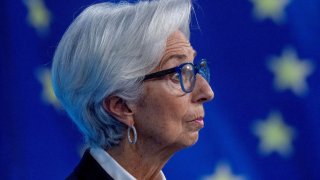
- With the war in Ukraine and the heavy sanctions on Russia the economic outlook for the euro zone has deteriorated sharply.
- Supply chain bottlenecks, high energy prices and concern about a general scarcity of commodities needed for many industrial processes is weighing on the economic outlook.
- At the same time, inflation rates just keep on rising and there are also tentative signs that this surge is not only down to energy prices, but is more persistent.
The European Central Bank faces an increasingly difficult task as it meets this week, with inflation surging and the economic outlook getting more uncertain as the Russia-Ukraine war drags on.
The minutes from the ECB's last meeting shows that as inflation hit 7.5% in March, fraught discussions within the Governing Council were also heating up on how speedy policy normalization should be.
"Determining the appropriate pace for policy normalization in the current macro-economic environment has not become easier for the ECB," said Dirk Schumacher at Natixis in a recent research note.
Get South Florida local news, weather forecasts and entertainment stories to your inbox. Sign up for NBC South Florida newsletters.
"The crucial question for the April meeting is whether the end of net purchases will be brought forward," he added, referencing massive bond purchases that the ECB has undertaken to try to stimulate the euro zone economy and push up inflation.
One option could be that ECB President Christine Lagarde will signal that the Governing Council is leaning toward ending these net purchases in the early part of the third quarter, Schumacher added.
Money Report
Once this bond buying has been completed, then the interest rate lift off can start — mirroring central banks in the U.K. and U.S.
Dutch central banker and renowned ECB hawk, Klaas Knot, said earlier in April that when the bank was back from its summer break, then "I don't think we are currently in the position to exclude any possible scenario in respect of lift off ... September, October, December — it could all be possible."
With the war in Ukraine and the heavy sanctions on Russia the economic outlook for the euro zone has deteriorated sharply. Supply chain bottlenecks, high energy prices and concern about a general scarcity of commodities needed for many industrial processes is weighing on the economic outlook. At the same time, inflation rates just keep on rising and there are also tentative signs that this surge is not only down to energy prices, but is more persistent.
"We are increasingly confident that inflation dynamics over the medium term will not return to the pattern we saw before the pandemic," Lagarde said herself at a conference on March 17.
"But we need to manage a shock that, in the short term, pushes inflation above our target and reduces growth."
Keeping all options on the table will be the main message for the meeting on Thursday. That may also include discussion on a new policy instrument, a dormant backstop which might be activated in case sovereign debt yields for euro zone nations start to widen again amid the policy normalization process.
"The most controversial debate at the ECB may revolve around a potential new tool to prevent a hypothetical widening of the yield spreads at a pace and/or level that an ECB majority may consider excessive," said Holger Schmieding, chief economist at Berenberg, in a note.
A spread refers to the difference in yields between two bonds from different euro zone governments. The spread between German and Italian yields, for example, is used as a fear gauge by market participants in times of financial stress.






